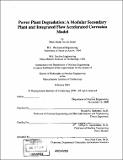Power plant degradation : a modular secondary plant and integral flow accelerated corrosion model
Author(s)
Van der Helm, Mark Johan, 1972-
DownloadFull printable version (16.75Mb)
Other Contributors
Massachusetts Institute of Technology. Dept. of Nuclear Engineering.
Advisor
Ronald G. Ballinger.
Terms of use
Metadata
Show full item recordAbstract
Flow Accelerated Corrosion (FAC) is the most prevalent material degradation mechanism for low carbon steel in steam-water flow systems. The band of uncertainty in predictions of wear rate due to FAC spans one to two orders of magnitude. Such a wide range of uncertainty inhibits the ability to devise safe and economical repair and replacement schedules. The goal of this thesis is to reduce uncertainty of predictions of wear caused by FAC. Reduction in the uncertainty in FAC wear rate predictions is achieved through the development of a new predictive FAC model, the incorporation of this model in a flow system analysis environment, and the use of this environment to identify improved methodologies for predicting FAC wear rate. The new FAC model is based on a published empirical model, published data, and physical mechanisms identified to be significant in the wear process. The new FAC model is shown to have less uncertainty for single phase lab data and single and two phase plant data. The flow system analysis environment is an interactive program that calculates parameters relevant to the FAC phenomenon based on plant description. Functionality of this environment is validated for each of the four calculations it performs: thermodynamic, thermal hydraulic, chemistry, and degradation rate. Additionally, this environment can be used to analyze contributions to uncertainty that are not yet identified. This environment was used to analyze the contribution to uncertainty from the current method of incorporating chemistry parameters in predictions of FAC wear. Based on this analysis, suggestions are made to improve these methods, thereby reducing prediction uncertainty and improving the knowledge necessary for safer and more economical plant operation.
Description
Thesis (Ph.D.)--Massachusetts Institute of Technology, Dept. of Nuclear Engineering, February 2001. Includes bibliographical references (leaves 198-204).
Date issued
2001Department
Massachusetts Institute of Technology. Department of Nuclear Engineering; Massachusetts Institute of Technology. Department of Nuclear Science and EngineeringPublisher
Massachusetts Institute of Technology
Keywords
Nuclear Engineering.